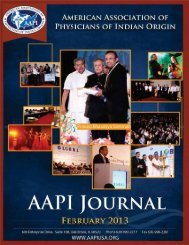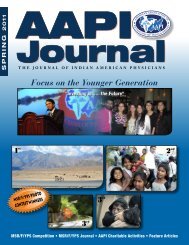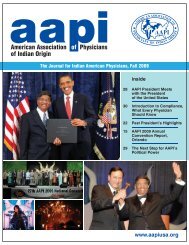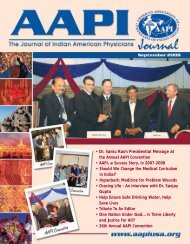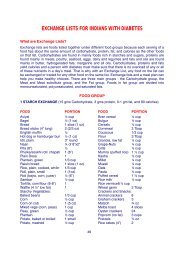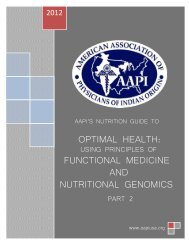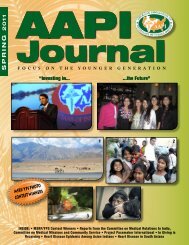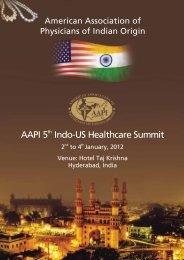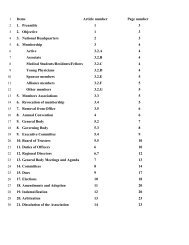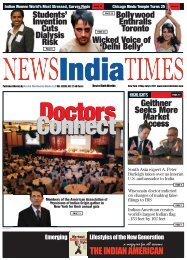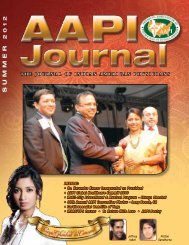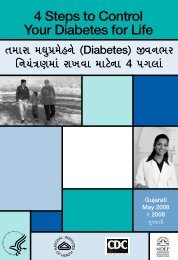Great Equalization: Is MBBS From India Equal To M.D. In U.S.A?
Great Equalization: Is MBBS From India Equal To M.D. In U.S.A?
Great Equalization: Is MBBS From India Equal To M.D. In U.S.A?
You also want an ePaper? Increase the reach of your titles
YUMPU automatically turns print PDFs into web optimized ePapers that Google loves.
AAPI Journal • March 2009<br />
SPECIAL ARTICLE<br />
Suffocation<br />
by Riddhi Shah, M.D.<br />
Riddhi Shah, M.D.<br />
Dominica, West <strong>In</strong>dies<br />
...It has been a lifelong pattern<br />
with me to come back to strength<br />
from a position of extreme weakness:<br />
I had been almost suffocated and<br />
then found that I was breathing more<br />
deeply than ever.<br />
Saul Bellow<br />
Doctors need to be both affable<br />
and competent. Both of these traits<br />
are equally important in patient<br />
care. <strong>In</strong> college, I minored in<br />
communications, where a premium<br />
was placed on interacting with and<br />
relating to an extremely diverse<br />
student body. My volunteer<br />
activities at the time – as a science<br />
tutor in an inner-city high school<br />
and working in the Emergency<br />
Room of a sprawling public hospital<br />
focused on honing these skills<br />
outside the classroom. However,<br />
while all of these experiences added<br />
to my appreciation for medicine, it<br />
took a near tragedy in the second<br />
half of my sophomore year of<br />
college for me to fully realize the<br />
responsibilities entrusted to a<br />
physician, and ideals I should strive<br />
towards both as a medical student<br />
and as a practicing physician.<br />
A little more than four years ago<br />
(even though it still feels like last<br />
week), after my friends and I had<br />
returned from a carefree Spring<br />
Break, my routine physical was<br />
anything but routine. My doctor’s<br />
hands lingered a little too long, and<br />
she seemed to grimace a little. First, I<br />
mentally scolded myself for being<br />
paranoid, but I knew as soon as she<br />
asked if I performed monthly breast<br />
exams that something was wrong.<br />
Only after helping me up did she tell<br />
me that there was a suspicious mass<br />
in my breast. She gave me a moment<br />
for this to sink in, and then quietly<br />
asked if I wanted to tell my mother, or<br />
if she should break the news. I<br />
opened my mouth to speak, but no<br />
words came out. Weakly, I nodded,<br />
still thinking that I could wake up<br />
from this bad dream at any moment.<br />
When my mother entered the<br />
exam room, my doctor explained the<br />
situation as delicately as she could.<br />
She detailed tests I would have to<br />
undergo to determine whether this<br />
was a tumor or a cyst, the likely<br />
outcome of each and a tentative plan<br />
of action. Upon hearing “tumor” my<br />
mother’s eyes glazed over, since for<br />
her (and most other <strong><strong>In</strong>dia</strong>n parents),<br />
tumor almost reflexively means<br />
cancer. Patiently, my doctor went<br />
through the explanation again, even<br />
more delicately this time, and then<br />
added that there was no chance I<br />
had cancer.<br />
I returned home utterly shocked and<br />
confused. My head, full of answerless<br />
questions, was spinning. Why me?<br />
Was this because of something I had<br />
done? And of course, what now? Not<br />
knowing what to do, I sought truth in<br />
statistics since after all, numbers don’t<br />
lie. On the <strong>In</strong>ternet, I found statistics<br />
that teenagers develop breast cancer<br />
about 5% of the time. The first thing I<br />
did was call my doctor. She had lied;<br />
there was a chance, albeit a very small<br />
one. She tried her best to console me<br />
and then reminded me that since I<br />
wasn’t just a number, it made no sense<br />
to look for comfort in them.<br />
The rest of that semester was spent<br />
scurrying from one doctor to another.<br />
For the first time in my life,<br />
schoolwork had taken a back seat.<br />
Everywhere I went both the doctors<br />
and the nurses did their best to<br />
convince me that they understood<br />
how I felt. Even though I knew they<br />
couldn’t possibly, their concern was<br />
both palpable and genuine. I still<br />
remember how the doctor performing<br />
my biopsy sent for someone to hold<br />
my hand and talk to me during the<br />
procedure so that I wouldn’t see the<br />
needle she used.<br />
A few days after my biopsy, my<br />
doctor informed me that I had a<br />
benign tumor and that due to its size,<br />
it would be best to remove it. I<br />
could also just leave it alone, and<br />
undergo surveillance in which case it<br />
could potentially do more harm. I<br />
opted for the surgery since although<br />
scary; it was less scary than the<br />
alternative. The surgery was<br />
scheduled for August.<br />
August came and went and<br />
eventually, everything settled down.<br />
<strong>In</strong> the end, I was left with memories<br />
and a scar, neither of which will ever<br />
fade completely. My work<br />
experiences in college had helped me<br />
develop some of the skills required to<br />
me a doctor, but I wasn’t able to<br />
completely internalize what being a<br />
physician required until I had almost<br />
“suffocated”. The opportunity to give<br />
others the same warm care I received<br />
is the impetus that will always keep<br />
me going.<br />
30 www.aapiusa.org



